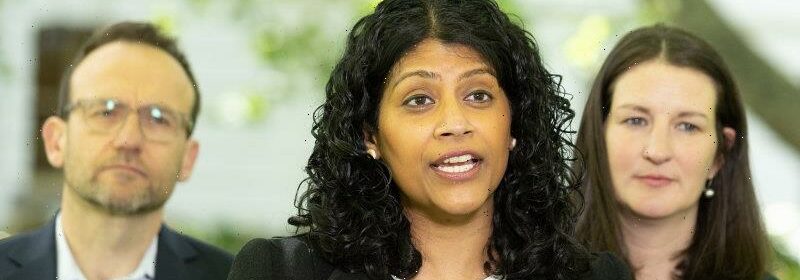‘There is no Greens-Liberal deal’: Greens to preference Labor in every seat

The Victorian Greens will preference Labor above the Liberals in every seat at the state election – and have called upon Labor to do the same.
With pre-polls due to open on Monday, parties are engaged in last-minute negotiations for preference deals, but Greens leader Samantha Ratnam said the minor party had not, and would not, negotiate with the Liberal Party.
Greens leader Samantha Ratnam, centre, with Melbourne MP Ellen Sandell and federal party leader Adam Bandt.Credit:Jason South
“If Labor is serious about a progressive parliament, they must commit to preferencing the Greens and progressive independents ahead of the Liberals across the state,” she said.
“What the Liberals do is up to the Liberals. We have not met with them and there is no Greens-Liberal deal. We’ll direct preferences to Labor and progressive parties across the state, and we’re calling on Labor to do the same.”
At a media conference in the ultra-marginal seat of Northcote on Monday, Premier Daniel Andrews rejected the possibility of forming minority government with the Greens, saying “no deal will be offered, and no deal will be done” with the party.
Labor’s Kat Theophanous won the seat by just 800 votes from now-Greens senator Lidia Thorpe in 2018.
Labor is also at risk of losing Richmond, held by retiring MP Richard Wynne, and Albert Park, held by retiring MP Martin Foley, to the Greens.
Liberal leader Matthew Guy was pressed on preferences on Wednesday, and refused to say whether the Liberals would preference the Greens over Labor.
“We’ll make sure we make those decisions after we see everyone who’s nominated,” he said.
So far, 19 minor parties – plus Labor, the Liberals, Greens and Nationals – have registered to contest the election.
Among them are the lockdown-inspired Angry Victorians Party, Freedom Party of Victoria and Restore Democracy Sack Dan Andrews Party.
Former Labor MP Kaushaliya Vaghela is the registered officer for the fledgling New Democrats party, while Pauline Hanson’s One Nation party and United Australia Party will have local candidates.
Ratnam said Labor’s failure to reform the group-voting ticket system in Victoria meant parties could have a candidate elected with as little as 0.5 per cent of the vote.
This, she said, meant there was a real chance of a far-right MP being elected to the Victorian parliament on November 26.
“Parties like One Nation, United Australia Party and Freedom Party are anathema to the vast majority of Victorians.”
Cut through the noise of federal politics with news, views and expert analysis from Jacqueline Maley. Subscribers can sign up to our weekly Inside Politics newsletter here.
Most Viewed in Politics
From our partners
Source: Read Full Article
